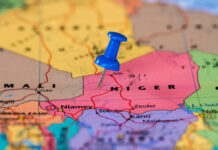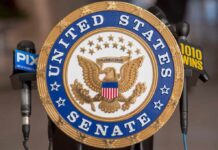
Outspoken Sen. Ted Cruz (R-TX) and fellow GOP lawmakers have aimed their ire at the forthcoming “Barbie” film, slated for release in the U.S. on July 21. The movie, starring Margot Robbie and Ryan Gosling, has raised eyebrows and sparked criticism for depicting a map showing a pro-China stance on the contested South China Sea islands.
The map’s controversy centers around including the “nine-dash line,” a long-standing geographical symbol indicating China’s control over certain regions, including the contested Paracel and Spratly Islands. This controversial depiction in a Hollywood film triggered Cruz’s assertion via a Twitter post, “I guess Barbie is made in China.”
I guess Barbie is made in China…. https://t.co/CDB1IzZcvm
— Ted Cruz (@tedcruz) July 3, 2023
The South China Sea islands have been a hotspot of international tension, with previous military conflicts in 1974 and 1988 between Vietnam and China. In 2016, a United Nations court ruled against China’s claim to the areas, yet the issue persists. The film has been banned in Vietnam for the alleged representation of pro-China propaganda.
A representative for Cruz voiced his concerns in a press statement, saying, “China wants to control what Americans see, hear, and ultimately think, and they leverage their massive film markets to coerce American companies into pushing Chinese Communist Party propaganda.”
Other GOP lawmakers, including Rep. Mike Gallagher (R-WI), also accuse Hollywood of succumbing to Chinese Communist Party (CCP) pressure. He called on Warner Bros. to clarify their position, emphasizing that the controversial map might have been unintended, but raises legitimate concerns.
“This is yet another disgraceful example of Hollywood being in the pocket of communist China,” declared Rep. Mike Waltz (R-FL). “It undermines our national security and exposes the film industry’s blatant hypocrisy,” he added.
Hollywood & the Left are more concerned with selling films in Communist China than standing up to the regime’s human rights abuses.
The ‘Barbie’ movie’s depiction of a map endorsing Beijing’s claims to the South China Sea is legally & morally wrong and must be taken seriously.
— Sen. Marsha Blackburn (@MarshaBlackburn) July 6, 2023
Further concern arose when Sen. Marsha Blackburn (R-TN) addressed the issue as a legal and moral fault, reiterating that the film’s depiction of a pro-China map is “legally and morally wrong.”
The “Barbie” movie controversy is a reminder of Hollywood’s dependence on China, the world’s second-largest film market. Critics argue that this dependence has caused Hollywood to ignore Beijing’s well-documented human rights violations.
Rep. Jim Banks (R-IN) echoed this sentiment, suggesting, “Movie executives who carry water for the murderous communist regime are endangering our national security and must face consequences.”
Amid escalating geopolitical tensions, the Barbie movie’s controversy indicates the larger narrative of Hollywood’s alleged compromise with Beijing’s interests. As these issues unfold, it remains to be seen whether other nations will follow Vietnam’s lead in banning the film or if Warner Bros. will respond to the outcry with a more measured approach to global concerns.



























